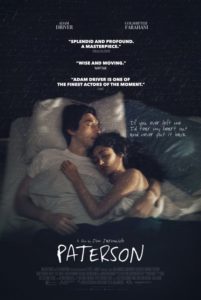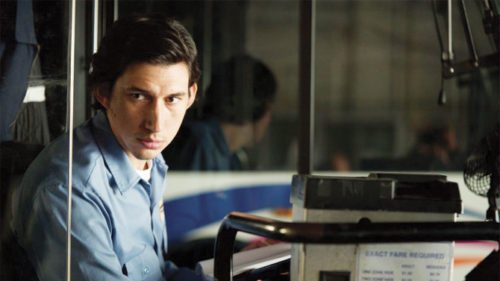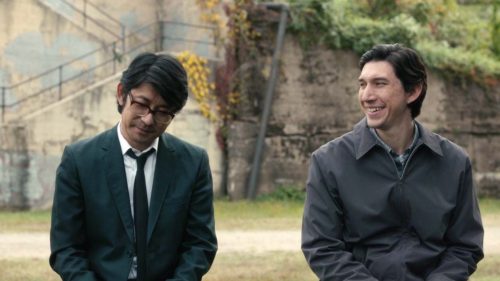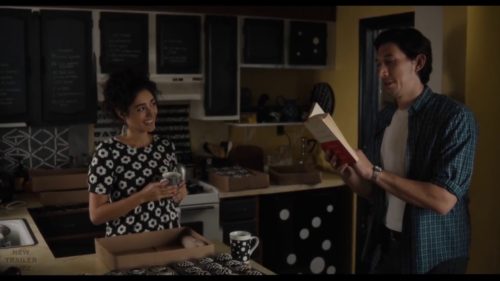 The poetry of details is what fuels Paterson, Jim Jarmusch’s movie about a bus-driver/poet named Paterson, who lives in Paterson, New Jersey. Jarmusch came up with the idea twenty-plus years ago when reading William Carlos Williams’s book of poems, Paterson, in which the idea of one man standing in for the city and the city standing in for one man struck him hard enough never to forget it.
The poetry of details is what fuels Paterson, Jim Jarmusch’s movie about a bus-driver/poet named Paterson, who lives in Paterson, New Jersey. Jarmusch came up with the idea twenty-plus years ago when reading William Carlos Williams’s book of poems, Paterson, in which the idea of one man standing in for the city and the city standing in for one man struck him hard enough never to forget it.
Adam Driver plays Paterson as a quiet, thoughtful, kind, and friendly man. We see a photo of him in military regalia, and in one scene he takes a gun off a man with a quick fluidity no doubt supplied by his military training, so I wondered, briefly, if Paterson would, in some small way, act out, or show us the inner demons with which he struggles. But this is a Jim Jarmusch movie, and even in the world of Jarmusch, there is very little one could call drama in Paterson. As Jarmusch puts it, the one action scene is when the bus breaks down and everyone has to get off and wait for a replacement to drive up.
Little drama is very much in Jarmusch’s wheelhouse, though. Paterson shows us a week in the life of Paterson, and there’s not a dull moment. Paterson wakes up, eats his Cheerios, drives his bus and writes poetry, comes home to his wife, Laura (Golshifteh Farahani), walks her dog to the local bar, and has a beer. Small variations arise, but small they are. There is one kind of dramatic promise made, when on the first day Laura begs Paterson to go to a copy store and photocopy the poems on the pages of his journal. She tells him he’s a great poet. He should share his poems with the world. He promises to do it on the weekend. Will he? Or won’t he? Drama!
Whether and/or how an artist shares their work with the world is a concern of Jarmusch’s. For his own work, he puts it this way:
I’m not trying to make a statement to the world. I’m trying to express something that those of us making the film feel… one reason I’m attracted to the New York School of poets is this idea of writing to one person. Not standing on top of the mountain, saying, “Here is what I believe!”
Among those in what is known as the NY School of poets is Ron Padgett, who wrote the poems used in Paterson. Unmetered and unrhymed, they tend toward the simple and observational, the picking out of details and rendering them, in some sense of the word, ecstatic.
They fit the mood of the movie. The movie is all about details. What Paterson sees as he drives his bus through town. What snippets of conversation he overhears. The myriad art projects his endearingly loopy wife is making/plans to make. The people he sees in the bar every night. The sound of the waterfalls in the middle of town.
These details don’t appear directly in the poems we see/hear him writing, rather they accrue in the way a poem’s details accrue, to create a full picture, but one not determined by action or drama.
The city of Paterson in the movie is surely not the real one in New Jersey. It’s more like…Jarmuschworld, let’s say. It’s the world all of his movies occupy. It’s someplace very like our world, but a bit cleaner, a bit nicer, and, most of all, more poetic (as the poetry of William Blake is central to Dead Man, so is the poetry of William Carlos Williams central to Paterson). As ever, it’s a multicultural world, but one where everyone gets along, where the multiculturalism is present but unremarked upon, where it’s expected that people from all corners of the world coexist naturally, where it doesn’t matter that we can’t speak the same language, it’s our humanity that connects us, and art that provides the bridge. When a Japanese man shows up at movie’s end, you feel like you’ve just been waiting for him to make his appearance.
In Paterson, life isn’t the big moments, it’s the little ones, the everyday ones. These are what, by and large, our lives consist of. Paterson the man takes the time to notice them, and Paterson the movie gives us the time both to think about the details and about how they inform art.
Should Paterson make copies of his poems? Does he owe the world his work? Is he, as his wife Laura insists, a great poet? Does it matter whether or not he is? And anyway, what is a great poet? How many people have to believe you’re one before you are? Is one enough? Is just you enough?
Driver is a much sought after actor these days. He’s able to do a lot with very little. He brings a lived-in reality to the smallest of parts, as in Inside Llewyn Davis, and makes even the biggest, most poorly written parts appear lifelike, as in The Force Awakens. As Paterson, he’s as understated as possible. His calm exterior is never really ruffled, yet he finds great depths in his expressionless silences. There’s a lot going on under Paterson’s surface. What he can’t express in emotion he does through his poetry.
Recently I saw Jarmusch’s other 2016 movie, the Iggy Pop documentary Gimme Danger, at an early critics screening. Since I merely write a blog, I don’t know anyone in the SF Bay Area movie critic scene, so I sat out of the way behind a group of critics chatting before the movie. Subject of their chat: that Jarmusch hadn’t made a good movie since Stranger Than Paradise. Your paid film critics at work, people. Laugh or weep, I don’t know. I couldn’t keep my mouth shut and asked one how in the world he couldn’t at least appreciate Down By Law, or Dead Man, or Ghost Dog, or Only Lovers Left Alive. He proceeded to vomit a thick stream of pretentious movie-critic waste (including some insane WTF-ery about Jarmusch’s misunderstanding in Ghost Dog of The Way of The Samurai (which work this critic claims a knowledge of even beyond the famed Japanese interpreters of such he named and also has beefs with)), all summed up with the room’s opinion that Jarmusch is “self-indulgent.”
Which term, I’ve come to realize, is shorthand for, “This artist who once made a thing I liked has made a thing I don’t like.” Because if an artist isn’t indulging themselves, who on earth should they be indulging? I want artists to make only what they feel they need to make. I might not like it, but so what? Their job isn’t to please me. The moment an artist goes down the road of “What do people want me to make?” they’re lost.
Anyhow, what really struck me was the idea that Jarmusch had once not been self-indulgent, but had then made a self-indulgent film or films. Because seriously now, is there any filmmaker more consistent than Jarmusch? The tone, pace, style, humor, subject matter of all his movies are essentially identical. How would you even go about determining which of them is self-indulgent and which isn’t? Oh, right. You’d have liked one and not liked another and been unable to come up with a reason why. “He’s made a movie for himself, the lousy criminal, rather than making it for me!” cries the emotionally unstable film critic.
Which is a long way of getting to my saying that if ever there was a Jim Jarmusch-like (Jarmuschian?) movie, it is Paterson. It is pure Jarmusch. It’s set in his world, it’s peopled by his people, its slow and meditative without being uninteresting, it’s thoughtful, it’s poetic, it is, in a word, lovely. Jarmusch made it for himself. You might like it too.






I look forward to reading all these posts after I finally get a chance to see the films, likely sometime in 2046.
2046. Good movie. As for Paterson, you can read this if you want. There’s nothing one can spoil about it.
I won’t get to watch 2046 until 2073.
Love Jarmusch, looking forward to this.
I found this meditatively enjoyable and was struck by the patterns (and rhymes, if you will) that looped in and out of the film to create a gentle sense of connection, which is there if we only bother to look and listen.
I think you typed “photos” when you meant to type “poems” at the end of paragraph 3 where it says: “He should share his photos with the world”.
Well, yeah, clearly. But, you see…it was…a test. Yes! A test, of course. I was waiting for someone to find my typo. And you did it! You win! The prize is a delicious apple pie! Sadly, the pie was fresh in 2017 when I wrote this, so, yeah. It’s not looking so good at present. But at least I’m going ahead and fixing the typo.